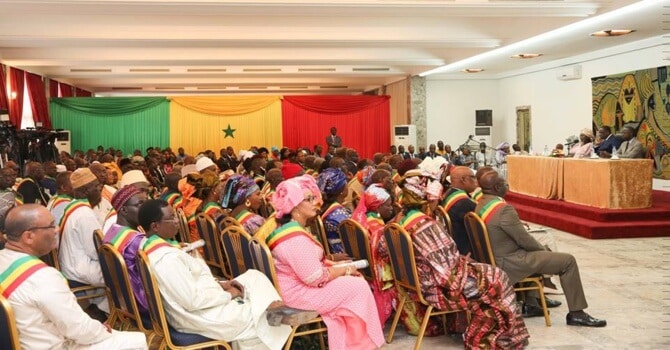Macky Sall, Dialogue to Close the Gash

History will one day tell whether President Macky Sall was wrong or right to suspend the electoral process. He was kind enough to explain to me the underlying reasons for the difficult decision he had to make. He fully appreciated the risk for his own image and the real risk of political and even security tumults for the country. Nevertheless, he considered that the stakes for the defence and preservation of the Republic, and the institutional and democratic viability were worth the effort. It is also a form of courage. My discussions with actors from all sides also allowed me to get rid of a certain dogmatism and to understand this decision, painful and undoubtedly fraught with consequences. I even showed great indulgence towards the Head of State by telling him that I was resigned to accepting this situation. I am not the only one in such a posture.
Read the column: “I refuse to believe that Macky Sall wanted to keep the power”
Everyone was able to observe the restraint, or prudence, one could even say understanding, unusual in such circumstances, shown in unison by Senegal’s traditional partners like the USA, the European Union or African institutions like the ECOWAS and the African Union. It is clear that Macky Sall is forced and forced to reach this extreme for which Senegal was not prepared. This is all the more difficult because he does not do it for himself, with the objective of keeping power, of remaining in his post. He is certainly impatient to hand over power to a successor elected in accordance with democratic rules and principles.
Read the column: The Postponement Conspirators
The National Assembly, seized by a bill proposed by the Wallu Parliamentary Group, will decide on the request to postpone the presidential election. The postponement of the vote should be logically recorded, because it is anticipated that the dynamics of collaboration between the parliamentary group of the majority and the MPs of the Senegalese Democratic Party (Pds) during the examination, last week, of the resolution establishing a Parliamentary commission of inquiry, will always be in place. The text allowing the National Assembly to open an investigation into alleged acts of corruption of members of the Constitutional Council was adopted by 120 votes to 24. It is difficult to envisage the possibility of a negative vote on the text due to the configuration of forces in the National Assembly. There will always remain uncertainty as to the outcome of an appeal for unconstitutionality, the possibility of which is certain. The deadlines for such an appeal will run before the Constitutional Council makes a decision. What would be the situation if the Constitutional Council revokes the law? This would add to the imbroglio. All this to say that, whatever the outcome of the procedural battle, it will prove materially impossible to hold the first round of the presidential election on February 25, 2024. Alea jacta est.
Respond to the dialogue in order to break the deadlock
What will remain to be done? Agree or be imposed a new electoral calendar. Hence the absolute need for political dialogue. In a solemn speech on February 3, 2024 announcing the sudden suspension of the electoral process, Macky Sall invited political actors and civil society to a new episode of dialogue. The wind of dialogue that President Macky Sall has just called for is blowing strongly and the rare political actors who say they oppose it will end up joining it or they will see history defined without them. Although the said political dialogue can only relate to the limits of a new electoral agenda. Moreover, the legalism surrounding the current political situation will in no way allow the country to get out of this impasse. We should gain height and have a political and realistic posture to avoid the pitfalls which stand, by force of circumstances, in the path of the country’s progress. Who can stick to their certainties and dogmatism to obscure or feign ignorance of an objective political situation?
The Presidential election postponed
We should undoubtedly be careful not to make the agenda of this dialogue too heavy. Otherwise, the implementation of the resulting conclusions could take time and would inevitably impact the deadlines for organizing the election.
Benno bokk yaakaar, the Senegalese Democratic Party, the Idy 2024 Coalition, like that of Aly Ngouille Ndiaye, among others, as well as large sections of civil society, will be at the dialogue. It’s starting to make people happy. In truth, the political class has no choice but to take part in the dialogue, and the decisions that result will have a certain legitimacy and will apply to everyone. Is it necessary to recall that on May 8, 2023, in a column entitled “Dialogue: the possible and the impossible”, we warned Ousmane Sonko and his supporters who refused to respond to the political dialogue invite of the government, that history will be written without them and at their expense or their detriment. These are the same actors who, once again, declare that they reject dialogue in order to seek to impose a balance of power from which they do not have the means to emerge victorious. Would they want non-political actors like the Army to end up imposing a new political and institutional order? If so, they will suffer like everyone else, and that would be throwing the baby of democracy and the institutional system of Senegal out with the bathwater. It will undoubtedly not be surprising if they once again adopt this propensity for collective suicide, because they already called for a military coup many times, notably on June 1, 2023. These pranks had reinforced the need to dissolve the Pastef party and should disqualify its leaders from any democratic political and electoral competition.
By Madiambal DIAGNE– mdiagne@lequotidien.sn

